| Home |
___ Burundi |
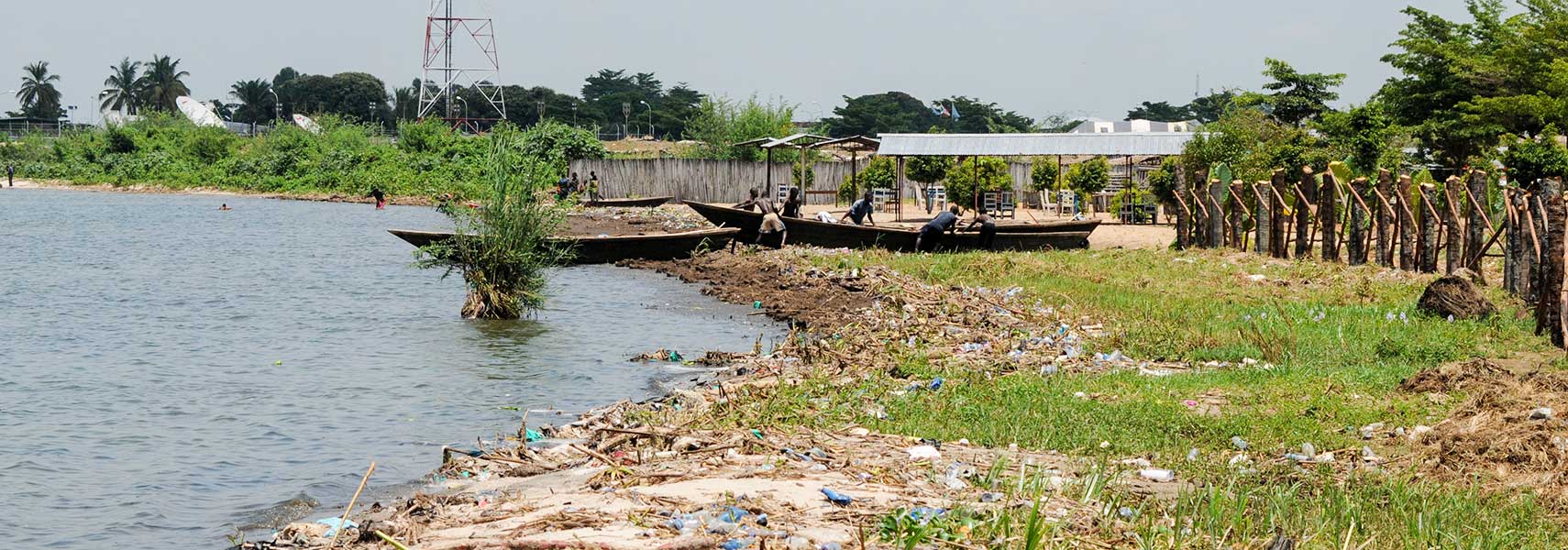 Fishing activities at Lake Tanganyika, Burundi. Image: SuSanA Secretariat |
|
A virtual guide to Burundi, a small landlocked country in the African Great Lakes region in central Eastern Africa bordering Lake Tanganyika in south west. The country shares borders with the Democratic Republic of the Congo, Rwanda, and Tanzania. With an area of 27,834 km², the country is somewhat smaller than half the size of Croatia, or slightly smaller than the U.S. state of Maryland. The country has a population of 10.11 million people (2016). Capital and largest city is Bujumbura. Spoken languages are French (official 0.3%) and Kirundi (spoken by nine million people in Burundi and adjacent parts of Tanzania and Congo-Kinshasa), other dialects like Rundi and Kiga. More than 80% percent of the population are Christians. This page aims to give you an overview of Burundi's art, culture, people, environment, geography, history, economy and government. |
Republic of Burundi | Republika y'u Burundi |
Country Profile |
Background: Burundi is a small nation in east-central Africa's Great Lakes region. Burundi's first democratically elected president was assassinated in October 1993 after only one hundred days in office. Since then, some 200,000 Burundians have perished in widespread, often intense ethnic violence between Hutu and Tutsi factions. Hundreds of thousands have been internally displaced or have become refugees in neighboring countries. Burundi troops, seeking to secure their borders, briefly intervened in the conflict in the Democratic Republic of the Congo in 1998. A new transitional government, inaugurated on 1 November 2001, signed a power-sharing agreement with the largest rebel faction in December 2003 and set in place a provisional constitution in October 2004. Implementation of the agreement has been problematic, however, as one remaining rebel group refuses to sign on and elections have been repeatedly delayed, clouding prospects for a sustainable peace. Elections in August 2005 have radically transformed Burundi's political landscape. The success of the former CNDD-FDD rebels, including the selection of Pierre Nkurunziza as president on 19 August, gives the party control of all branches of government. Concurrently, the security sector has been profoundly restructured with CNDD-FDD fighters now making up 40 per cent of the army. They provide a safeguard against attempted coups to interrupt the peace process and thus a guarantee that further reforms required under the Arusha agreement for peace and reconciliation will be realized. Nonetheless, the elections are just one, albeit important, step toward a lasting peace. related countries: Belgium |
Official Name: Republika y'u Burundi République du Burundi Republic of Burundi short form: Burundi formerly: Urundi ISO Country Code: bi, bdi Time: Local Time = UTC +2h Actual Time: Mon-Apr-22 23:32 Country Calling Code: +257 Capital City: Bujumbura (pop 300 000) Other Cities: Cibitoke, Muyinga, Ngozi, Bubanza, Gitega, Bururi. Government: Type: Republic; democratically elected, post-transition government established 26 August 2005. Independence: 1 July 1962 (from Belgium). Geography: Location: East-central Africa south of the Equator. Area: 27,834 km² (10,746 sq mi) Terrain: Hilly and mountainous, dropping to a plateau in east, some plains. Elevation extremes: lowest point: Lake Tanganyika 772 m highest point: Heha 2,670 m Climate: Tropical equatorial, with wet and dry seasons, temperature varies with altitude. People: Nationality: Burundian(s). Population: 10.11 million (2016) Ethnic groups (estimated): Hutu 85%; Tutsi 14%; Twa 1.0%. Religions (estimated): Roman Catholic 60%-65%; Protestant 10%-15%; traditional beliefs 15%-20%; Muslim 5%. Languages: Rundi (Kirundi), and French (offiocial), Swahili (trade and governmental language) Literacy: 37% Natural resources: Nickel, uranium, rare earth oxides, peat, cobalt, copper, platinum (not yet exploited), vanadium, arable land, hydropower. Agriculture products: Coffee, cotton, tea, corn, sorghum, sweet potatoes, bananas, manioc (tapioca); beef, milk, hides. Industries: Light consumer goods such as blankets, shoes, soap; assembly of imported components. Exports - commodities: coffee, tea, sugar, cotton, hides Exports partners: Germany 12.3%, Pakistan 10.7%, Democratic Republic of the Congo 10.7%, Uganda 8.1%, Sweden 7.8%, USA 7.1%, Belgium 6.3%, Rwanda 4.6%, France 4.4% (2015) Imports - commodities: capital goods, petroleum products, foodstuffs Imports partners: Kenya 15%, Saudi Arabia 14%, Belgium 9.9%, Tanzania 8.3%, Uganda 7.3%, China 7.1%, India 4.9%, France 4% (2015) Currency: Burundi franc (BIF) |
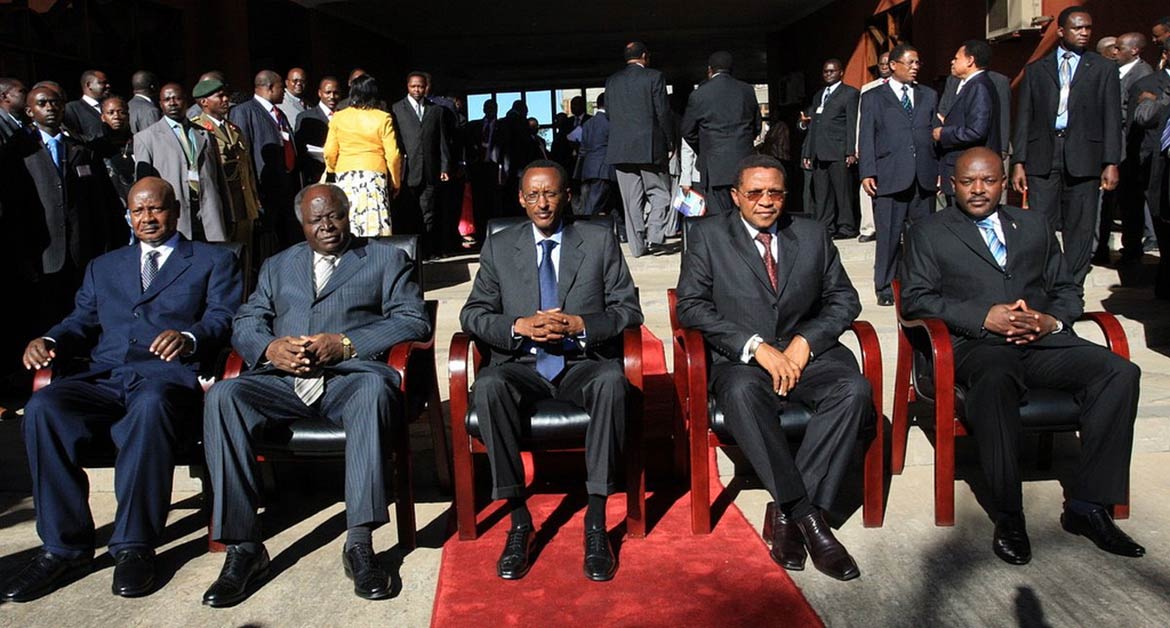 East African Community Head of States, Burundi's president who runs the country since 2005 on the far right. From left to right: Yoweri Museveni of Uganda, Mwai Kibaki of Kenya, Paul Kagame of Rwanda, Jakaya Kikwete of Tanzania, Pierre Nkurunzinza of Burundi. Image: nukta77 Political System Burundi's political system is a presidential representative democratic republic based upon a multi-party state. The President of Burundi is the head of state, head of government, and commander-in-chief of the armed forces. The cabinet consists of the Council of Ministers appointed by president. In defiance of the constitution, the sitting President of Burundi Pierre Nkurunziza, was re-elected for a third term in the July 2015 presidential election. The legislative branch is a bicameral parliament with a Senate and a National Assembly, both with a 5 years election cycle. Official Sites of BurundiNote: External links will open in a new browser window. République du Burundi - Portail du Gouvernement Official website of the Burundi government. (in French) Présidence Burundi Burundi's President Office. Assemblée Nationale du Burundi Burundi's National Assembly. (in French) Diplomatic Missions Embassy of The Republic of Burundi in the US Embassy of Burundi in Washington, in the U.S. Embassy of the Republic of Burundi to Germany Embassy of Burundi in Berlin, Germany. Ambassade du Burundi à Paris Embassy of Burundi in Paris, France. L'Institut de Statistiques et d’Etudes Economiques du Burundi (ISTEEBU) Institute for Statistics and Economic Research of Burundi. ONUB - United Nations Operation in Burundi ONUBS mission is to support and help to implement the efforts undertaken by Burundians to restore lasting peace and bring about national reconciliation, as provided under the Arusha Agreement. MapsPolitical map of Burundi. Searchable map and satellite view of Burundi. Searchable map and satellite view of Burundi's capital city. Political Map of Africa. |
Burundi NewsOperating in a turbulent political climate, Burundi's media are subject to self-censorship and occasional government censorship.Radio is the main source of information for many Burundians. The government runs the sole TV station, the only radio station with national coverage, as well as the only newspaper that publishes regularly. (BBC) Net Press Agence Burundaise de Presse; privately owned Burundi Press Agency (in French). Iwacu Les voix de Burundi (The Voices of Burundi), Burundi news in French and English. Burundi Realities Kind of outdated Analysis, Research, Information and Data on Burundi (French and English) Africatime Burundi Central news (in French). afrol News - Burundi Burundi related news in English and Spanish. IRIN Africa: Burundi Burundi News and background information. |
Bookmark/share this page 
|
Arts & CultureCulture, Religion, Dance, Music, Arts & Literature Expressions of Burundian Life and Culture, article about Burundi culture by the Embassy of the Republic of Burundi in Germany. Burundi : Musique AfroMix provide a list of contemporary Burundi musicians. |
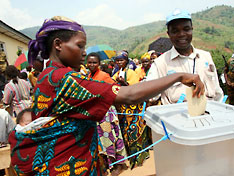 Election Burundi - a woman voting © ONUB Photo: Martine Perret 2005 |
Business & EconomyBurundi is a resource-poor country with an underdeveloped manufacturing sector. Agriculture accounts for over 40% of GDP and employs more than 90% of the population. Burundi's primary exports are coffee and tea, which account for 90% of foreign exchange earnings. Burundi is heavily dependent on aid from bilateral and multilateral donors.Ministère de l’Agriculture et de l’Elevage Burundi's Ministry of Agriculture and Livestock. Banque de la République du Burundi Central Bank Burundi. Banque de Credit de Bujumbura Belgium based private bank group. Coffee Coffee Board of Burundi (offline) Site provides information about the Coffee Board and arabica coffee farming. |
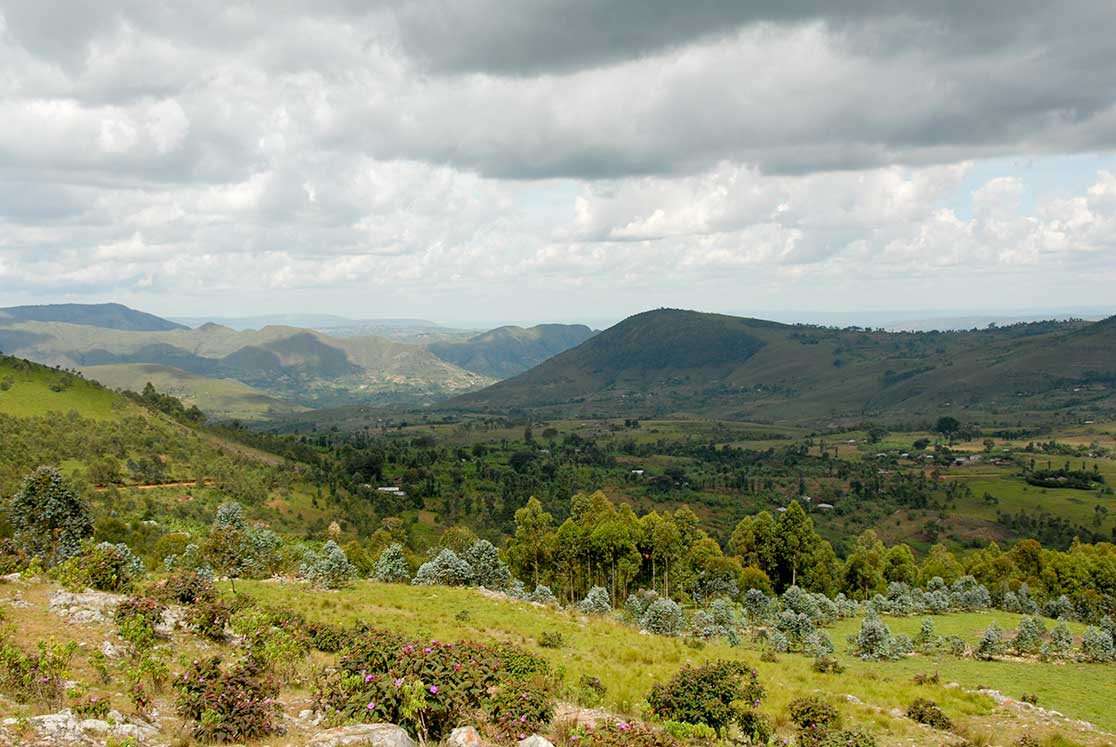 Landscapes of Burundi Image: Dave Proffer Travel and Tour Consumer Information
Destination BurundiDiscover Burundi Lake Tanganyika (one of the African Great Lakes, shared by Tanzania, the Democratic Republic of the Congo (DRC), Burundi, and Zambia); Kibira National Park (sacred primary montane rainforest); Rusizi National Park (nature reserve at the Rusizi River near Bujumbura) Burundi presentation - Travel and Tourism Some information about tourism in Burundi by the Embassy of the Republic of Burundi in Washington DC. Tourism in Burundi Wikipedia entry about tourism in Burundi. 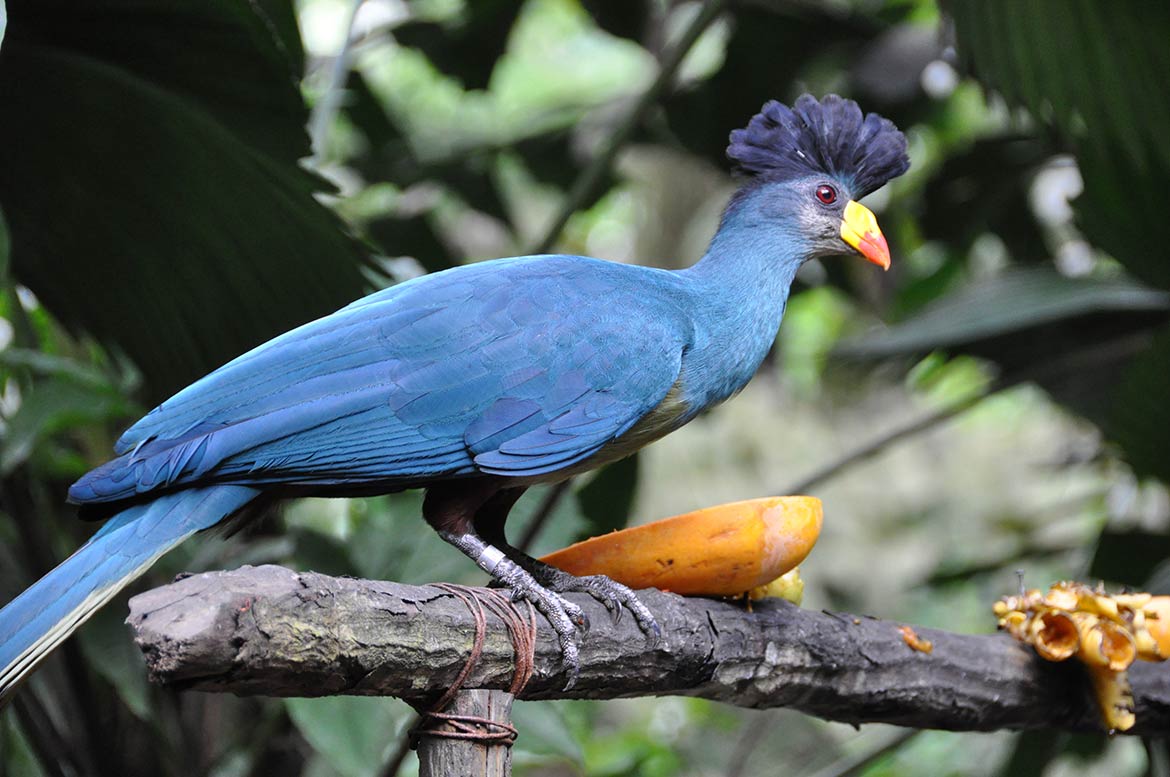 Great blue turaco, one of the bird species found in Kibira National Park in northwestern Burundi. Image: Michael Gwyther-Jones |
EducationUniversité du Burundi It is the only public university in Burundi. Official university web site with information about its mission, its institutions and its organisation structure. (in French) |
HistoryHistory of Burundi Wikipedia entry about Burundi's History. Burundi genocide Wikipedia article about the ethnic conflict between the Hutu and the Tutsi Tribes in Burundi. WWW-VL History Index of Burundi Collection of web resources related to the history of Burundi. |
Human Rights and Humanitarian CrisisAccording to FAO (Food and Agriculture Organization of the United Nations) sitrep of December 2016: 2.1 million people lacking reliable access to a sufficient quantity of affordable, nutritious food, of which more than 800,000 are severely food-insecure. 30,000 ha of farmland destroyed by climate hazards related to El Niño for the 2015/16 season. 428,170 people displaced by ongoing crisis and climate hazards, of which 139,000 were internally displaced and the rest in neighbouring countries. Ligue Burundaise des Droits de l'Homme Human Rights League of Burundi with information on the work of the league (in French.) OPDE - Oeuvre humanitaire pour la Protection et le Développement de l'Enfant en difficulté A humanitarian charity for the protection and development of the street children of the Great Lakes. Relief Web: Burundi The UN administered Relief Web with Humanitarian information on Burundi. Peace and Collaborative Development Network: Early warning for Burundi - It needs violence-prevention now! Article by Jan Oberg. |
Sources and additional Information on BurundiCountry Profiles: BBC Country Profile: Burundi The Transnational Foundation: Burundi FAO Country Profile Burundi GlobalEDGE: Burundi Human Rights Watch: Burundi OEC: Burundi Reporters Without Borders: Burundi Wikipedia: Burundi The World Factbook -- Burundi Web resources: Africa South of the Sahara: Burundi Stanford University. |
 |
One World - Nations Online .:. let's care for this planet Promote that every nation assumes responsibility for our world. Nations Online Project is made to improve cross-cultural understanding and global awareness. More signal - less NOISE |
| Site Map
| Information Sources | Disclaimer | Copyright © 1998-2023 :: nationsonline.org |